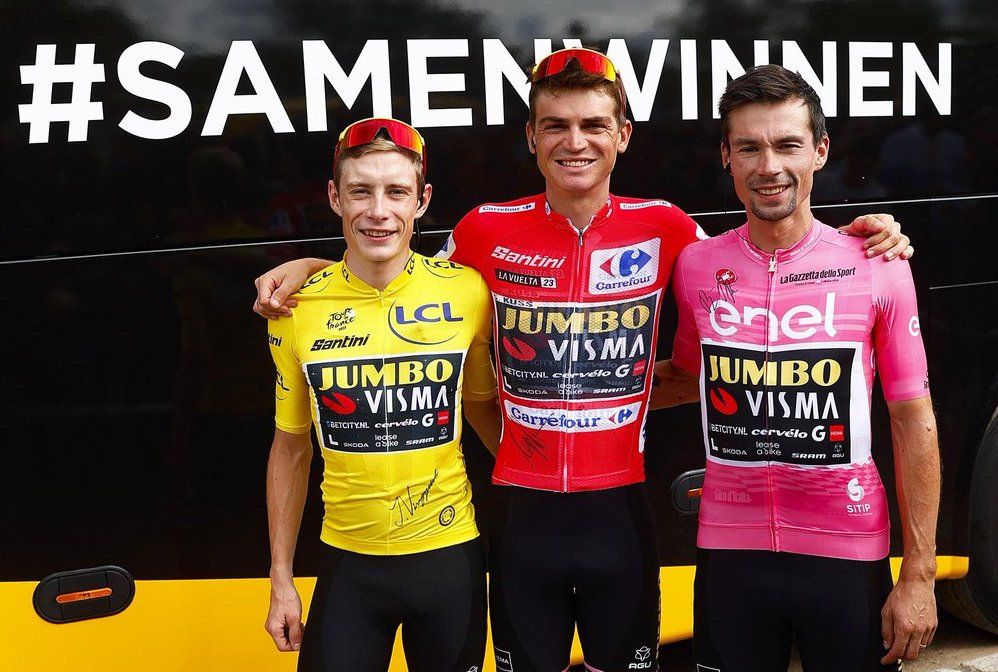The new Amazon Prime on has revealed details of the success and tension inside the team, with Sepp Kuss admitting in the heat of the moment after the leadership dispute at the Vuelta a España that he never wanted to be leader in a Grand Tour again.
The US rider has since had a change of heart and will ride the Tour de France alongside Jonas Vingegaard, and then have more of a leadership role at the Vuelta a España where he won the overall last year. The documentary reveals details of the power struggle inside Jumbo-Visma as they dominated the Vuelta and tried to complete their hattrick of Grand Tour victories.
The five-part documentary is called ‘All-in: The Trilogy’ and is similar to the Netflix Tour de France ‘Unchained’ series, with camera crews embedded on the team bus and in hotels during the 2023 season.
The documentary is visible on Prime Video in Belgium, Denmark, Finland, Iceland, Luxembourg, Netherlands, Norway, Slovenia and Sweden, with hopes there will be a worldwide release later in the year.
The opening episodes tell the story of Primož Roglič’s victory at the Giro d’Italia. Episodes three and four cover the Tour de France, with Jumbo-Visma admitting they might not win the Tour after an early display of strength from Tadej Pogačar (UAE Team Emirates). Of course, the Slovenian eventually cracked in the Alps after Vingegaard’s dominant ride in the hilly time trial.
The tensions of the Vuelta a España are covered in the final episode, with the internal rivalry becoming clear after Remco Evenepoel (Soudal-QuickStep) cracked on the stage over the Tourmalet.
Vingegaard argued for some kind of status quo after Kuss kept the leader’s red jersey but Roglič did not agree.
“I have been honest. I said I wanted to win. And that meant I would attack,” Roglič said.
The team tried to defuse the tension via a series of meetings and it was agreed that the riders could each ride their own race.
“I was confused. This was rivalry and politics that went over my head,” Kuss said at one point.
The team’s motto of “samen winnen” – “winning together” seemed to have been forgotten, as was the hard work Kuss had often done for his teammates. On stage 17 to Altu de L’Angliru, Roglič openly attacked Kuss and the American struggled, his lead falling to just eight seconds on Vingegaard. It was only thanks to help from Mikkel Landa that Kuss kept the race lead that day.
“I am very grateful to Mikel. He can drink beer at my expense for the rest of his life,” Kuss said.
That evening, as the team was widely criticised for their tactics, senior directeur sportif Merijn Zeeman called a decisive meeting and ruled that the team would ride for Kuss. “We don’t attack each other anymore,” he said.
Sadly, the documentary camera screw was not allowed into the meeting but Kuss ended the Vuelta with mixed emotions.
“Never again in my life,” he said in the documentary. “I never want to be a leader in a Grand Tour again.”
The documentary also reveals how Kuss raced on at the Giro d’Italia after a positive test for COVID-19. He suffered minor symptoms and so was allowed to stay in the race and help Roglič win.
Wout van Aert’s anger and frustrations at not winning a stage early in the Tour de France were also covered in the documentary. When Victor Lafay snatched the stage victory in San Sebastian, he appeared to be angry that Vingegaard did not help with the chase.
“I’m angry because I miss the victory, not because of how we raced,” Van Aert said after apologising for his outburst.
Despite Pogačar suffering a fractured scaphoid at Liège-Bastogne-Liège, Jumbo-Visma were worried about the Slovenian after he looked strong in the first half of the Tour de France and even managed to distance Vingegaad on the first real mountain atop the Puy de Dôme.
“He’s much stronger than last year,” Vingegaard admitted at one point. “It’s not that I started doubting myself, but it did make me think.”
“We are not going to win the Tour this year,” Zeeman admits at one point, only to study Vingegaard’s performance and change his mind.
Jumbo-Visma continued with their strategy of making Pogačar suffer day after day and then Vingegaard gained 1:38 on him in the Alpine time trial. The day after he cracked and lost 7:37 before fighting back to finish second overall in Paris.
“The plan worked. But in the difficult moments, Merijn Zeeman is very important to keep me calm,” Vingegaard concluded.
